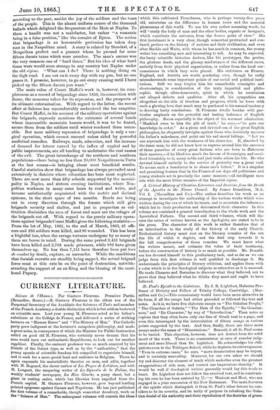St. Paul's Epistk to the Galatians. By J. B. L
ightfoot, Hulsoian Pro- fessor of Divinity and Fellow of Trinity College, Cambridge. (Mac- millan and Co.)—This commentary would have been more attractive in its form, if all the essays had either preceded or followed the text and notes. As it is, we have five elaborate essays on "The Galatian People," "The Churches of Galatia," "The Date of the Epistle," "Its Genuine- ness," and "Its Character," by way of "Introduction." Then notes so copious that they often leave only one line of Greek text to a page, and
even this interrupted by the intercalation of fifteen essays on various points suggested by the text. And then, finally, there are throe more essays under the name of "Dissertations." Beneath it all St. Paul seems to be buried. This objection, however, does not detract from the solid merit of the work. There is no commentator at once of sounder judg- ment and more liberal than Dr. Lightfoot. He acknowledges his obli- gations even to the Tubingen School, while he deplores its extravagances. "Even in extreme cases," he says, "mere denunciation may be unjust, and is certainly unavailing. Moreover, for our own sakes we should try and discover tho element of truth which underlies even the greatest exaggerations of able men, and correct our impressions thereby." It would be well if theological writers generally would lay this truth to heart. Dr. Lightfoot does not follow the received text, and in construct- ing his own he has been assisted by Mc:7 Westeott and Hort, who are
engaged in a joint rescension of the New festament. The main features of the epistle which distinguish it from St. Paul's other letters he con- siders-to be its severity, and its unity of purpose in rebuking the Gala- tian denial of his authority and their repudiation of the doctrine of graoe.






























 Previous page
Previous page